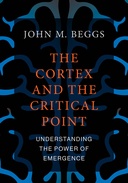Explore

How the cerebral cortex operates near a critical phase transition point for optimum performance. Individual neurons have limited computational powers, but when they work together, it is almost like magic. Firing synchronously and then breaking off to improvise by themselves, they can be paradoxically both independent and interdependent. This happens near the critical point: when neurons are poised between a phase where activity is damped and a phase where it is amplified, where information processing is optimized, and complex emergent activity patterns arise. The claim that neurons in the cortex work best when they operate near the critical point is known as the criticality hypothesis. In this book John Beggs—one of the pioneers of this hypothesis—offers an introduction to the critical point and its relevance to the brain. Drawing on recent experimental evidence, Beggs first explains the main ideas underlying the criticality hypotheses and emergent phenomena. He then discusses the critical point and its two main consequences—first, scale-free properties that confer optimum information processing; and second, universality, or the idea that complex emergent phenomena, like that seen near the critical point, can be explained by relatively simple models that are applicable across species and scale. Finally, Beggs considers future directions for the field, including research on homeostatic regulation, quasicriticality, and the expansion of the cortex and intelligence. An appendix provides technical material; many chapters include exercises that use freely available code and data sets.
This book is included in DOAB.
Why read this book? Have your say.
You must be logged in to comment.
Rights Information
Are you the author or publisher of this work? If so, you can claim it as yours by registering as an Unglue.it rights holder.Downloads
This work has been downloaded 78 times via unglue.it ebook links.
- 78 - pdf (CC BY-NC-ND) at Unglue.it.
Keywords
- Applied Physics
- artificial intelligence
- Biology, Life Sciences
- Computational neuroscience
- Computer science
- Computing & information technology
- Cortex
- critical point
- Cryogenics
- Electrophysiology.
- Epilepsy
- Homeostasis
- Information theory
- Life sciences: general issues
- Mathematics & science
- Neural Network
- Neural networks & fuzzy systems
- Neuronal avalanche
- neuroscience
- Neurosciences
- Optimality
- phase transition
- Physics
- power law
- thema EDItEUR::P Mathematics and Science::PH Physics::PHV Applied physics::PHVS Cryogenics
- thema EDItEUR::P Mathematics and Science::PS Biology, life sciences::PSA Life sciences: general issues::PSAN Neurosciences
- thema EDItEUR::U Computing and Information Technology::UY Computer science::UYQ Artificial intelligence::UYQN Neural networks and fuzzy systems
- Universality
Links
DOI: 10.7551/mitpress/13588.001.0001Editions

